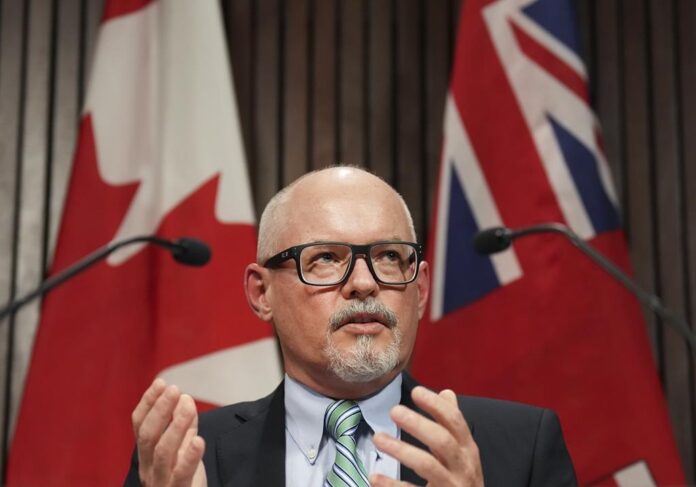Ontario is set to make a decision early next week on whether to expand eligibility of fourth doses of COVID-19 vaccines, amid a seventh wave of the virus, the province’s top doctor said Thursday.
Ontario has been under pressure to expand eligibility for fourth doses of a COVID-19 vaccine beyond people aged 60 and older, immunocompromised people and Indigenous populations, as Quebec has done. That province has opened up eligibility to all adults.
Chief Medical Officer of Health Dr. Kieran Moore said in an interview that he anticipates news on that will come next week on “both whether and how” to expand the rollout, but he said he is most concerned about the number of people who have not had a third dose yet.
“Of those five million that haven’t had even their first booster, many of whom it’s well after six months since their last dose, one million of them are over 50 years of age and we know age is a really significant risk factor for COVID, severe outcomes and hospitalization,” Moore said.
“So we’re asking first before we open up any further that one million, well all five million but one million over 50 who haven’t come forward, please consider getting vaccinated in the month of July.”
For people 59 and under a second booster may not give significant protection against severe outcomes because they were not at risk for severe outcomes to begin with, Moore said.
“We always do a risk-based strategy and a risk-based communication on the immunization rollout and if those (currently eligible) groups stop coming forward, and we see volumes of patients coming forward to be immunized are decreasing, we will increase the eligibility criteria,” he said.
Ontario and Quebec are experiencing seventh waves of COVID-19, but health officials in both provinces are predicting they will soon peak.
Quebec public health director Dr. Luc Boileau said Thursday that while the highly contagious Omicron subvariants BA.4 and BA.5 are well established in Quebec and behind the rise in cases and hospitalizations, there are signs it will peak this month.
“We expect the evolution to curve down during the month of July, but there are uncertainties over that,” he added. “The curve is slower than a week ago, so that’s a small sign that we might get to the other side of it in the near future.”
Trending Stories
$350K raised for Burger King worker who got a paltry gift bag for 27-year service
Boris Johnson agrees to resign, will remain PM for now
In Ontario, case numbers, positivity and hospitalizations were all on the rise. Moore said he expects Ontario could see the wave peak next week.
Moore said that if people decide to get their third dose now, it wouldn’t prevent them from getting a new vaccine in the fall, should they become available.
Several vaccine manufacturers are racing to develop formulas that can target Omicron and Moore said it’s hoped those are available in the fall. Ontario is planning to bring back a mass vaccination strategy for at-risk people if the so-called bivalent vaccines become available and inoculate up to 100,000 people a day.
If a bivalent vaccine is not available on that timeline, there is still “ample” supply of the original Moderna and Pfizer vaccines for the fall, Moore said.
Quebec Health Minister Christian Dube encouraged Quebecers to get their COVID-19 booster shot. He said he had been considering waiting for his own fourth dose until September in the event a more effective vaccine became available.
Instead, Dube, who is 65, decided to get boosted on Thursday. “It’s been more than three months (since my last dose). I’m in the category of people that if I caught it, I could be in more difficulty than someone who is 25 or 30,” Dube said. If needed, he’ll get another dose in the fall after another three to four months have passed.
“I think when it comes to the booster dose, with the recommendations from public health, I was more comfortable getting it now. and I think others should do the same,” he said.
Officials said that despite the current uptick in COVID-19 indicators, they don’t plan to reimpose new public health orders, such as mask mandates on public transit. Instead, officials urged those who are infected with COVID-19 to follow isolation guidelines and for those who haven’t received a vaccination booster to make an appointment.
“I think the entire world is fed up with COVID, but I think we said all along that we need to live with this COVID,” Dube said Thursday, adding that the situation is considered under control.
Boileau said one of the factors driving transmission is that infected people aren’t respecting the province’s 10-day isolation rules from the moment symptoms appear. Infected people should spend the first five days at home, then wear a mask outside for the following five days, he said.
“Basically, this is what explains the current wave: it’s the fact that those who have (COVID-19) are giving it to others,” Boileau said. “Visibly, there are a lot of people not respecting (the rules) and it would be a good thing if they did.”
On Thursday, Quebec reported 1,534 people hospitalized with COVID-19, a rise of 37 from the day before. Officials said 43 people were in intensive care, an increase of three. They reported another 16 deaths linked to the disease.
A weekly update released Thursday by Public Health Ontario showed a 20 per cent week-over-week increase in cases, a rise in the positivity rate from 8.4 per cent to 11.2 per cent, and indications that hospitalizations and deaths were rising.
© 2022 The Canadian Press



